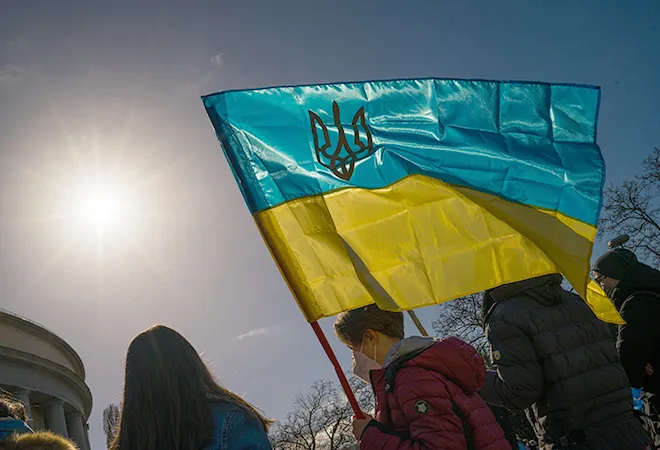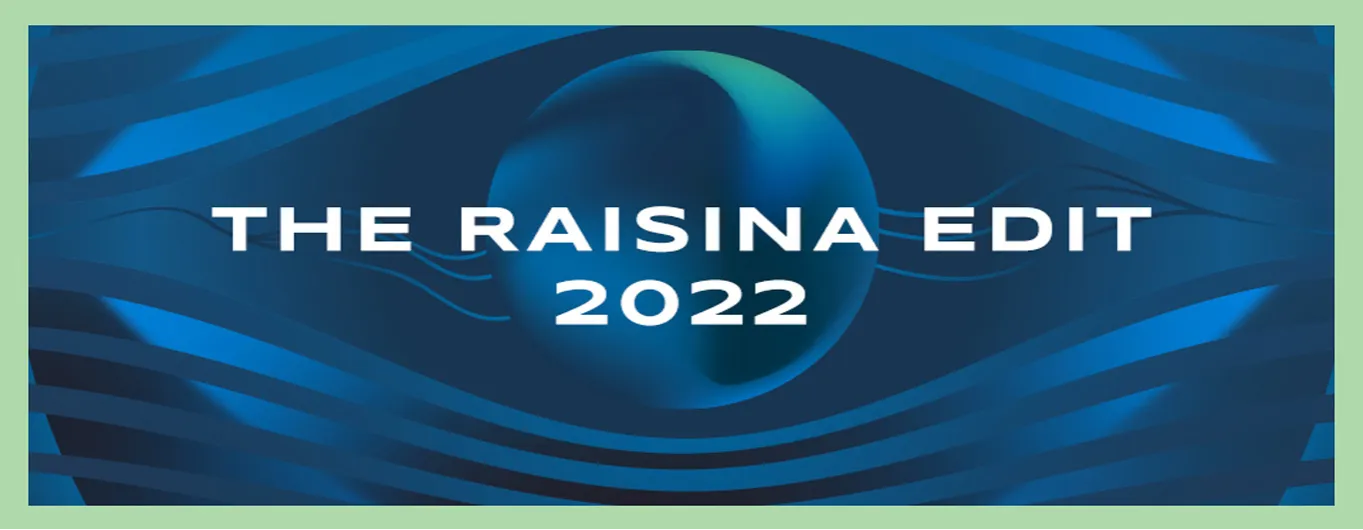 This article is part of the series—Raisina Edit 2022
This article is part of the series—Raisina Edit 2022
The founding narrative of the European Union (EU)—to promote peace—has never been more relevant. Roiled by two years of a deadly pandemic that has cost millions of lives around the world, wreaked havoc with economies, and deepened political and social fissures, the European Union today confronts what for seven decades had seemed unthinkable: a major land war on the European continent. With the brutal and unprovoked attack on Ukraine, Russian President Vladimir Putin has not only violated the sovereignty of a neighbouring state, but he has also challenged the European security order.
In the wake of Putin’s aggression, the EU and the wider West have shown remarkable resolve and unity.
Policies that had stoked fierce arguments were suddenly adopted almost overnight. EU member states, together with their closest allies, quickly aligned to impose a package of crippling economic sanctions on Russia and to purchase and deliver arms to Ukraine. Many countries, including Ukraine’s neighbours, opened their borders to refugees, who have been given the right to live and work in the European Union.
EU member states, together with their closest allies, quickly aligned to impose a package of crippling economic sanctions on Russia and to purchase and deliver arms to Ukraine.
Inspired by the bravery of the Ukrainian people and the leadership of their impassioned president, Volodymyr Zelensky, the European Union has been roused from its geostrategic slumber. It has emerged re-energised, unified, and emboldened to defend the principles it has enshrined in its treaties—respect for human dignity, freedom, democracy, equality, the rule of law, and respect for human rights, including the rights of persons belonging to minorities (
Article 2, Treaty on European Union).
The day that Russian troops invaded Ukraine (24 February 2022) is already deemed a major historical turning point. What we are witnessing is neither the end of history nor the end of liberalism, but the beginning of an age of disruption, disorder, and dissent that may stretch on for decades. While the fight for democracy, freedom, and a nation’s right to choose its own destiny is as relevant as ever, these values are also increasingly under threat. However relevant Europe’s founding narrative may be today, it is unfolding in a radically changed world.
Contrary to the unquestioned belief in the advance of liberal democracy in the aftermath of the Cold War, preserving peace, freedom, and democracy on the European continent and across the wider world will be a heavily contested fight. Putin’s aggression in Ukraine is just the most recent and the most violent example of the pushback against the current order. Rhetoric has played a central role in this confrontation. Both China and Russia have weaponised narratives to their advantage in increasingly sophisticated disinformation campaigns.
Their vision of an alternative world order exposes the fragility of the current one.
According to Freedom House, democratic regimes have been backsliding for the past 16 years, a trend that has only been accelerated by the COVID-19 pandemic. In Europe too, anti-democratic and illiberal ideas have gained ground.
What is more, Europe and the wider West’s rekindled enthusiasm for defending democratic liberties and self-determination does not resonate equally in other parts of the world. China’s reluctance to condemn the Russian invasion of Ukraine is a crucial factor. Other powers—such as India, South Africa, and Vietnam—with whom the EU has long sought to deepen its ties have also refrained from condemning Russia’s war. All this shows that, beyond Europe’s immediate allies, support in defending the current order will be hard to come by. Convincing countries beyond the immediate West will be crucial if Europe’s current geopolitical awakening is to translate into a more prominent geopolitical posture. Mistaking unity in its own ranks for a wider global consensus, however, could do more to alienate other powers rather than rally them to Europe’s cause.
Convincing countries beyond the immediate West will be crucial if Europe’s current geopolitical awakening is to translate into a more prominent geopolitical posture.
To do that effectively, Europeans—individually and collectively—need to own up to their colonial past. Echoes of colonialism still impede the resonance of Europe’s narrative on freedom and democracy, and often stand in the way of more effective cooperation with partners in Africa, Asia, and the Middle East. A failure to openly acknowledge its dark past risks playing into the narrative of Western civilisational exceptionalism and arrogance that is propagated by Europe’s adversaries, who seek to portray liberal democracy as Western white hypocrisy.
At the same time, Europe should be bolder in calling out the neoimperial posture of Russia and China when it comes to challenging the independence of their neighbouring countries or China’s exploitation of raw materials on much of the African continent.
In his speech to the UN Security Council condemning Russia’s invasion of Ukraine as “stoking the embers of past empires”, the Kenyan ambassador to the United Nations, Martin Kimani, has demonstrated how this can be done to great effect.
It will be equally important for the EU to continue to stand up to those who challenge liberal democracy from within its borders. By openly confronting and addressing its own shortcomings on democracy and rule of law, the EU will give itself the best chance of forging alliances with other countries around the globe that are battling similar problems. If it coins the fight for freedom and democracy in a discourse of humility and frames it as a common challenge that Europe shares with other countries, then Europe’s narrative as defender of democracy is more likely to resonate than its previous attempts to cast itself as a model to others.
In the fog of war, Europe has found a new clarity about what it stands for. A narrative built around a collective effort to fight for peace, freedom, and democracy resonates today as strongly as it ever has done. By mobilising support for a core set of beliefs, the EU can deliver on the unity and decisiveness it will need to overcome the enormous geopolitical, economic, ecological, and domestic challenges it confronts. To connect its own plight to those of partners around the world, the EU also needs to take the time to listen and absorb how others around the world regard it.
The views expressed above belong to the author(s). ORF research and analyses now available on Telegram! Click here to access our curated content — blogs, longforms and interviews.



 This article is part of the series—
This article is part of the series— PREV
PREV



